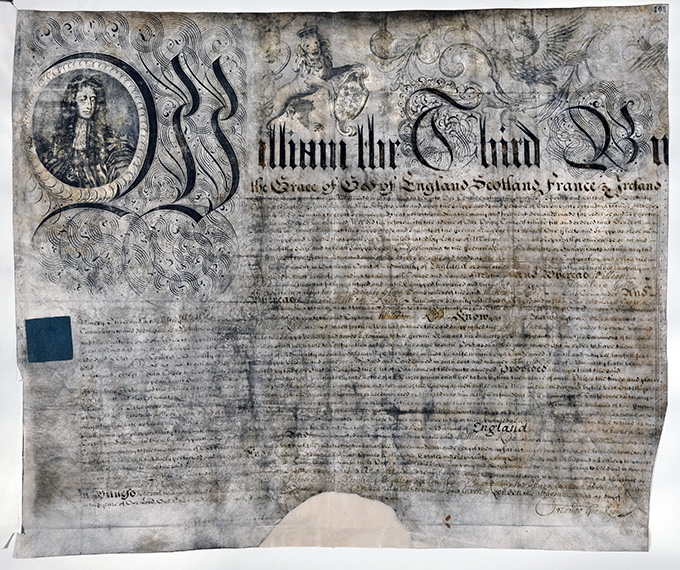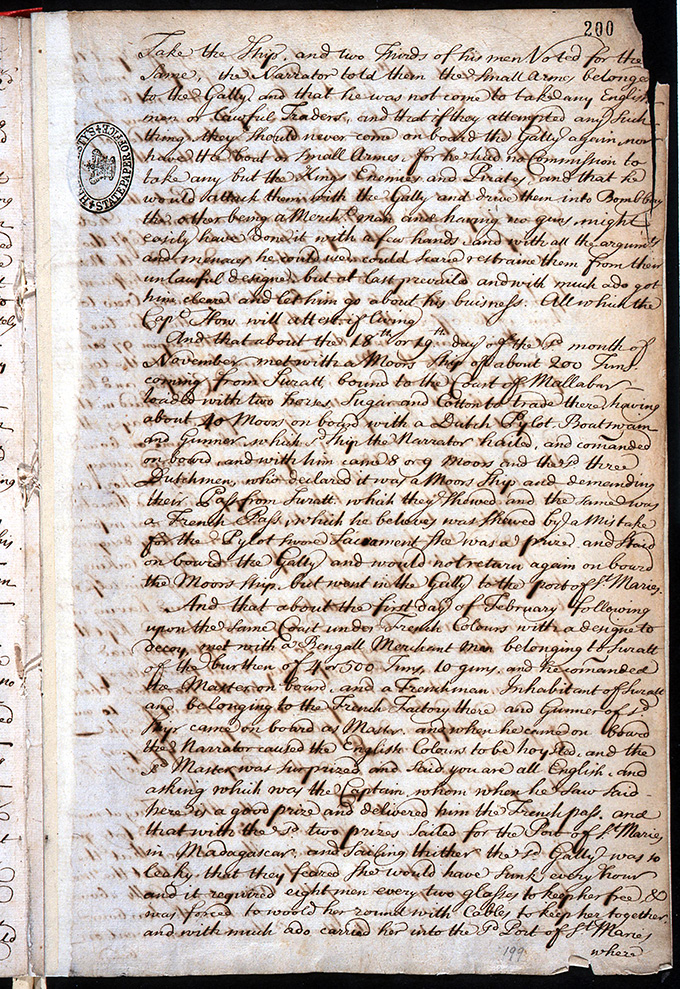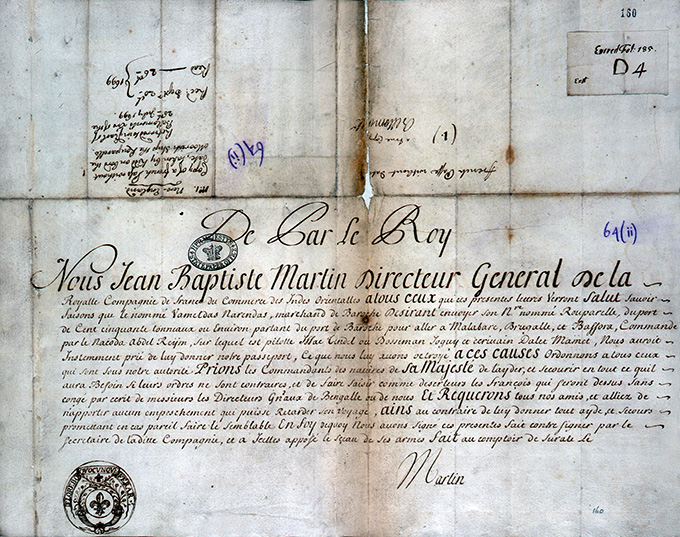In his ground-breaking postmodern collection, ‘A Universal History of Infamy’, Jorge Luis Borges deals with an assortment of historic villains. He condenses their careers into five or six short episodes. Along with Billy the Kid, he includes the female Chinese pirate, Ching Shih. But Borges could have applied his episodic yet seamless melding of fact and fiction to the life of William Kidd. He is, after all, equally prominent in the pantheon of bygone desperados.
The National Archives’ online catalogue isn’t very forthcoming on Kidd. However, a reading of Robert C Ritchie’s ‘Captain Kidd and the War against the Pirates’ (Cambridge, Mass., 1986) shows that a number of records from the Colonial Office and High Court of Admiralty illuminate key episodes in Kidd’s career.
Kidd’s early history is somewhat obscure. He was perhaps born in Greenock, west of Glasgow, around 1645, but that is not certain. We know that he was a privateer in the Caribbean during the Nine Years War. He took part in Admiral Codrington’s raid on the French colonial island of Marie-Galante. By 1695, Kidd was in New York, married to a wealthy widow, Sarah Oort. On the other hand, documents at The National Archives shed much light on the six years between Kidd’s fateful decision to leave New York for London in 1695 and his execution in 1701.

William Kidd’s commission as a privateer, 1695. Catologue ref: HCA 1/15
In 1695, Kidd concocted a plan to travel to London to acquire a royal commission as a privateer. He intended to capture pirate ships which preyed on the rich Mughal convoys travelling between India and the Red Sea.
Accompanied by a Scot, Robert Livingstone, who moved in New York political circles, Kidd arrived in London in 1695. They met the prominent Whig, Richard Coote, Earl of Bellomont, new governor of New York. Bellomont became Kidd’s chief patron in a Whig syndicate to share the profits from his expedition. They persuaded King William III to grant Kidd a commission to apprehend pirates and to seize French ships.
Kidd acquired the Adventure Galley, a hybrid ship powered by sail or oar, and armed with 34 cannon. It was ideal for hunting down buccaneers. Early in 1698 The Galley sailed for New York to complete its crew and then to the Indian Ocean. Here pirates preyed on the rich Mughal convoys travelling between India and the Red Sea. Kidd arrived at Madagascar early in 1697, but failed to take any prizes. The crew became rebellious forcing Kidd to assert his authority. He killed a gunner, William Moore, by breaking his skull with a bucket.

Captain Kidd’s account of his capture of the Quedah Merchant. It was handed to Lord Bellomont on Kidd’s return to New York. Catalogue ref: CO 5/860
Increasingly desperate, Kidd turned to what was really piracy. First he captured a Dutch-owned ship, the Roupparelle, tricking its captain, Michael Dickers, by flying French colours. Dickers duly produced a ‘French pass’, showing that Roupparelle was at least nominally a French ship. This gave Kidd some legal justification for his actions.
Such a meagre prize was insufficient to satisfy Kidd and his crew for long, or, for that matter, his patrons in London. His big chance came when Adventure Galley crossed the path of the unescorted Quedah Merchant, returning to Surat from Bengal. She was carrying a rich cargo of fabrics, opium and sugar. On 30th January 1698, Kidd detained the ship, again using the ploy of flying French colours.
The Quedah Merchant failed to offer resistance, but Kidd had made a fatal error. A prominent politician at the Mughal court owned much of the cargo. The Emperor, Aurangzeb, was outraged by the loss and demanded compensation from the East India Company. In 1698, Parliament passed the Piracy Act, showing an increased determination to stamp out robbery on the seas. By the time Kidd returned to New York via the West Indies, he was a wanted man.
Kidd got in touch with Bellomont through a lawyer. He handed over evidence, including a statement and the ‘French passes’. This was a mistake. Bellomont, now anxious to distance himself from the project, had Kidd arrested and transported to London. He spent 1700 incarcerated in Newgate Prison before his trial at the Old Bailey on 8th May 1701.
Kidd defended himself against charges of murder and piracy. He pinned his hopes on the French passes, but they were nowhere to be found. Presumably, his opponents had concealed them. Researchers found the documents a few hundred years later in a Colonial Office volume at The National Archives.

The ‘French pass’ given to Kidd by the captain of the Rouperelle. Catalogue ref: CO 5/860
In any case, Kidd faced a rigged trial and made the journey to execution dock in Wapping on 28th May. He arrived drunk to deliver a defiant speech. Even Kidd’s hanging went wrong, as the rope snapped, and he died at the second attempt. It’s tempting to think that he took that fall for his wealthy backers.
Research by David Dobson a Scottish Historian proved that William Kidd was born in Dundee but lived in Greenock. William Kidd in documents at Greenock described himself as being from Dundee.
That’s interesting – perhaps certainty on the question has emerged.
I believe he was captured with the help of a Captain roger bellwood and others.
Joelle–There was a William Kidd born in Dundee of John Kidd X Bessie Butchard and this is no doubt the William Kidd to whom Dobson is referring. I would like to find the primary source document by Dobson in which he details his thoughts that this indeed is the same William Kidd. Are you able to refer me to them? Many thanks in advance.
The information that Kidd was born in 1645 comes from Paul Lorraine, minister who interviewed Kidd just before his death. According to Lorraine, Kidd was 57 years of age which, in 1701, would put his birth at 1645 and not 1654, the latter being the William Kidd of Dundee.
It is sometimes cited that Kidd named one of his slaves Dundee, as evidence of Kidd’s birthplace. But Kidd also named one of his slaves Ventura.
Particularly interested in learning if there are any records to support that Captain William Kidd shortly after his return to New York in 1698-99 made a stop along the Rhode Island coastline ( Narragansett Bay) to confer with Captain Thomas Paine who resided in same state.
Dear David
Thanks for getting in touch. Daniel Gilfoyle (the author of the blog post) writes:
I’m not sure if Paine was mentioned in the documentation, but the best thing would be to check Robert C Ritchie’s ‘Captain Kidd and the War against the Pirates’ (Cambridge, Mass., 1986) to see if he mentions the incident and gives a source. It might be worth checking CO 5/860, to see if any account of Kidd’s meeting with Paine is given there.
I wonder if anyone is aware of any scanned copies that one can ready of Kidd’s account of his capture of the Quedah Merchant as pictured in the article? It was be very interesting to read the full accound in Kidd’s own hand.
I am looking for information on the raffle of Captain Kidd’s personal effects on the dock. Supposedly, the proceeds were given to charity. Any suggestions for getting this information?
My interest is in the ‘French passes’ that Kidd had hoped to produce as evidence at the Old Bailey in 1701. The strong suggestion is that he had entrusted them to Bellomont who must have conspired to make them unavailable. I read an account that said they were discovered in an unidentified building in 1912; another account says 1910. Do we have any idea as to how and exactly when they got into a colonial office volume at the National Archive or whether they were anywhere else during their 200 year absence? Many thanks.
He was most definitely from Dundee the Kidd name traces back there for nearly 800 years I hope you change this information